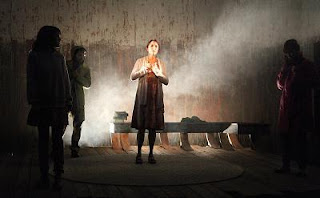 |
| Joe Cassidy in foreground with cast of "Working " at 59E59 Theaters in a Prospect Theater Company production. Photo by Richard Termine. |
For most people, work is more than a job. It's about more than collecting a paycheck. It's about making a contribution.
"Working A Musical," at 59E59 Theaters in a production by the Prospect Theater Company through December 30th, celebrates the dignity of the American workforce. The closing number, Craig Carnelia's "Something To Point To," for instance, is a song of workers' pride in what they do.
Based on Studs Terkel's seminal series of interviews, "Working" was originally adapted by Stephen Schwartz and Nina Faso, for a Chicago run at the Goodman Theatre in 1977 and moved to Broadway where it closed after just 24 post preview performances. It has been revised and performed many times since in Chicago and LA, Florida, New Haven and San Diego. The current revival, which also commemorates Terkel's centenary, adds two new songs by Lin-Manuel Miranda and has additional contributions to the book by director Gordon Greenberg.
 |
| Marie-France Arcilla with the cast behind her working in a factory to the James Taylor tune "Millwork."Photo by Richard Termine. |
(music) or Craig Carnelia's "The Mason."
 |
| "It's An Art," according to Delores Dante (Donna Lynne Champlin with cast in background). Photo by Richard Termine. |
Variety is the spice of this musical tribute to "what we do all day," as Terkel put it. Everyone gets to work in several settings. In "Working," six hard-working actors portay 36 of Terkel's industrious subjects. For instance, Joe Cassidy is credibly and movingly by turns an ironworker, hedge fund manager, a publicist, and a retiree.
Among the workers interviewed in "Working," there is a factory worker (Marie-France Arcilla), a sex worker (Kenita R. Miller), a stone mason (Nahal Joshi), a fireman and a UPS driver (Jay Armstrong Johnson), a nanny and a flight attendant (Marie-France again), a cleaning lady (Kenita), a fast food worker (Nahal), and a school teacher (Donna Lynne). Each has his own story and song in the vignettes that make up the show.
 |
| Nehal Joshi, Jay Armstrong Johnson, and Joe Cassidy with Marie-France Arcilla, Kenita R. Miller and Donna Lynne Champlin behind them in Taylor's "Brother Trucker." Photo by Richard Termine. |
Along with Donna Lynne Champlin's show-stopping contributions as Delores and then again as the school teacher, Rose Hoffman, there is also Joe Cassidy's poignant portrayal of the retiree, Joe Zutty in Carnelia's "Joe," neatly followed by "A Very Good Day" by Miranda and performed by Nehal Joshi as a elder-care worker, Utkarsh Trajillo and Marie-France Arcilla as the nanny, Theresa Liu. Kenita R. Miller's Kate Rushton, "Just A Housewife" (Carnelia), and Maggie Holmes, "A Cleanin' Lady" (Grant) contrast with her buttomed-up project manager, Amanda McKenny, and her all-out prostitute Roberta Victor.
The pace is fast, and the subject interesting. In this economy, it sometimes feels like just having a job is a gift, but "Working" is about all the people who do the jobs--menial and meaningful-- and how they feel about what they accomplish each day.
For more information about "Working," visit www.59e59.org, please.







































